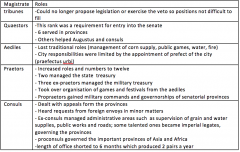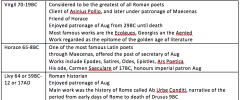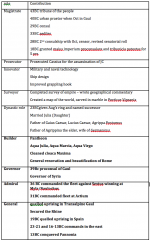![]()
![]()
![]()
Use LEFT and RIGHT arrow keys to navigate between flashcards;
Use UP and DOWN arrow keys to flip the card;
H to show hint;
A reads text to speech;
22 Cards in this Set
- Front
- Back
|
1 Establishment of the principate
|
***
|
|
|
continued
|
•Assassinated 44 BCE
• Main assassins Brutus & Cassius • Antony emerges as a leader Rome → through social approval • MA lost favor by not declaring JC a god & trying to take JC’s provinces Lost favor from all groups (Welch) SOURCES: |
|
|
Early career of Octavian
|
• Octavian marches Rome → demands position in senate (ILLEGAL!)
• Oct gains favor by intending to avenge JC and paying out to the plebeians • Holds gladiatorial games (pleases plebs) comet appears →Oct declares JC a god. • Antony leaves Rome (forces go to Oct.) → Oct. gets even more favor • Cicero speaks out against Antony • Octavian defeats Antony • Brutus & Cassius are given imperium → Octavian not the only one who has control of army now. • Antony goes to Gaul befriends Lepidus → now avenge JC’S death |
|
|
– Second Triumvirate & Civil War
|
• Proscriptions begin → declared enemies to be outlawed killed by anyone
• All political enemies killed → have all the power can do anything • 42 BCE Battle of Philippi → Cassius & Brutus defeated (killed themselves) • MA goes to east → Octavian settles the veterans • Antony arrives back alarmed Oct. acting as sole power • Octavian’s marries daughter of one of Sextus followers → Scribonia • Oct. and MA forces meet at brundisium → troops refuse to fight → same cause • OCT and Antony compelled to make agreement → Treaty of Brundisium • Antony leaves back to east → Oct. remains in Italy control of all west • MA marries Octavia • Sextus creates grain shortage → forces Oct. into Treaty of Misenum (39BCE) • Triumvirate extended for 5 years • Agrippa defeats Sextus 36 BCE • Lepidus tries to take Sicily →Oct. persuades to join him → Lepidus resigns •Oct Immunity of Tribune •Reveals Antony intends to rule Rome with Cleopatra • Senate cancels all of Antony's power |
|
|
Consequences and significance of the Battle of Actium
|
• 31 BCE
• Antony had more ships → Oct. blocked them by camping on higher ground • Antony's troops already demoralised by propaganda war → oct persuaded MA troops to change sides • Could have been to defeat blockade → everyone instead surrendered • 13years of battle → now sole ruler → emerged on top • Wallace Hadrill → “Dio is right. This date if any marks a turning point in roman history: on which the republic finally irrevocably ends, and the empire or principate the rule of impertores or principeps begins” • Egypt annexed to Rome • Personal domain of Octavian → huge triumph for oct → so rich → rulers as gods → now saw Oct. as one • Egypt’s wealth was used to pay for the campaigns, adorn Rome • Dio claims “the romans forgot all their unpleasant experiences and viewed his triumph with pleasure” |
|
|
Development of the principate: settlements of 27 C
|
- In 27BC Octavian handed back the unofficial powers he had held during the civil war to the SPQR
- in returning his powers, he gave up his absolute authority in the provinces as well as his control of the legions that were stationed there, the basis of his power. - the senate’s response was to plead with Octavian to reverse his decision -> he accepted their offer of totally legal powers: - slow to make haste → salmon CHECK ATTACHEMENTS |
|
|
23 BC
|
- Spent time in provinces from 27-23 -> gave senators with ill feelings towards him an opportunity to conspire against him
- He tried and executed the participants - he fell ill and relinquished his consulship, a step that necessitated a reorganisation of the political structures established in first settlement |
|
|
Titles, honours and images of the princeps
|

He wished to be remembered as:
- a triumphant general - a saviour of citizens lives - a bringer of peace - a religious leader - conservative traditionalist - the saviour of the city of Rome Used as a propaganda tool - used to promote main themes of peace victory and military successes his family and the establishment of the dynasty, titles honours his great "generosity" |
|
|
2 The Augustan principate
– Augustus and the Senate: roles and responsibilities |
- elevated new men and qualified ones from provinces of Spain and Gaul to senatorial rank
- promoted the equestrians (forever in debt) Reforms of senate: - Member had to possess at least one million sesterces in assests - Only men who were already of senatorial rank could stand for political office - Tried to restore prestige of the senate - Senators required to make offerings at the commencement of sessions and were fined if neglected to attend - Sessions reduced to twice a month The consilium: - Introduction of senatorial council (consilium) - Made up of Augustus and Agrippa, the two consuls, - a representative of each of the magistrates and fifteen extra senators |
|
|
– Roles of magistrates and officials
|

|
|
|
– Significance of equestrians and freedmen
|
Equestrians:
- Aug could ensure that the empire was competently managed - Equestrian class enabled Augustus to revive the traditions of republican Roman society Freedmen: Were slaved who’s mastered had freed them. - 17BC (lex lunia) – gave freedmen Latin status but restricted their social, financial and political rights, but their children were allowed Roman citizenship - 2BC (lex Fufia Caninia) limited number of slaves that could be freed by a master - 4 AD (lex Aelia Sentia) – introduced age limits Educated freedmen played roles in administration Even though they had these significant roles they were barred them from holding public office or serve in legions |
|
|
– Augustan reforms: political, social, legal, religious and administrative
|
Social:
Concerned for the status of the family and the morality of the Roman people 19-18BC Aug introduced leges Iuliae (bills) - penalised those who didn’t marry - men of senatorial rank who were married with 3 or more children would have his career rapidly promoted -penalised adultery and defined the circumstances under which Romans could be divorced Legal: Needed to reforms laws to go with the social reforms - reorganised legal procedures to alleviate the lengthy delays that characterised the system - created new courts to take pressure off general courts - appointed more judges for more cases - instituted severe penalties for evading jury duty Religious Augustus aimed to revive the belief that pietas, the proper observation of the old ceremonies and rituals, would maintain Rome’s success and underpin the new age |
|
|
– Opposition to Augustus
|
Opposition to Augustus:
Reasons for opposition can be seen – it was a time of substantial political and social change - No mention of opposition in res gestae - G.Cornelius Cinna Magnus – grandson of Pompey plotted to assassinate – pardoned by plea from Livia - Julia (his daughter) –banishment possibly result of conspiring against her father or not |
|
|
- Augustus’ building programs: the Forum Augustum, the Ara Pacis
|
Building Program:
architecture could play in both his own promotion and that of the Roman Empire. Besides glorifying himself and the Julian family, Forum Augustum: - A powerful piece of propaganda - The focus of the Forum was the temple of Mars Ultor The Ara Pacis: - The altar of Augustun peace was built on the Campus Martius - Important Augustun monument as it is a visual representation of the values of his reign - Pax=peace - gravitas=authority -humanitas=humane character -familia=family Piece of propaganda as it depicts the moral and religious tenets of his reign |
|
|
Pantheon, Campus Martius
|
Pantheon:
- The pantheon was built by Agrippa as a temple to all the gods Campus Martius: - Swampy area on the west bend of the Tiber river was dedicated to Mars, God of War, and was therefore known as the campus Martius or filed of Mars. - Originally outside the walls of Rome and used as a location for meeting and housing foreign envoys |
|
|
– Literature and propaganda: Virgil, Horace and Livy; role of Maecenas
|

Maecenas:
- close friend of augustus (alike agrippa) - run rome when augustus was away |
|
|
– Imperial family and problems of the succession; role of imperial women: Livia, Julia
|
The women had to set a positive example to society and were important in the formation of dynastic marriages
- Were expected to be modest, marry young, have large families, exhibit a feminine form of gravitas Livia - played symbolic role - symbolised womanhood - imperial mother - the promoter of family unity and the destroyer of the imperial family Julia - Only daughter of Aug - Age of 14 married to Marcellus – he dies 2 years later and she was married to Agrippa (who was in his 40s) – had 5 children in this marriage - When Agrippa died she was married to Tiberius - In 2BCtook advantage of her father’s reoccupations and her husband’s retirement to Rhodes and indulged in an orgy of scandalous behaviour -Esulted in her arrest and trial for adultery and treason -Immediate divorce from Tiberius and her banishment to Pandateria. - Her mother accompanied her in exile – moved to Rhegium where they died of malnutrition 14AD |
|
|
– Role and contribution of Agrippa
|

Dio = celebrated victories with aug and his main man, very loyal and when he died public loss it caused chaos, humalitas refused triumph → crossed the rhine
Tacitus = wasn't a threat to Augustus Galinsky = “right hand man and consulship → “no one contributed more to octavians success than Agrippa” |
|
|
– Death of Augustus
|
- Tiberius was successor
- In 14AD he accompanied Tiberius to Illyricum to see legions, Nola Campania – dies there with livia and Tiberius at his side - Funeral magnificent - Senate announced him Divus Augustus – member of pantheon gods TACITUS SUGGESTS LIVIA POISONED HIM |
|
|
3 Augustus and the empire
– Augustus and the army |
- Making it an instrument of state rather than a weapon
- Augustan structure retained for next few centuries Became tradition for the ruler to be a capable military figure - Keen to keep army under his control and separate the military and political roles that the army could play - Received their pay from Aug himself and later from military treasury – eliminated general/soldier relationship - Army reliant on Aug |
|
|
– Provincial government: imperial and senatorial
|

|
|
|
– Frontier policy
|
The claim to peace actually applied only to the area within the borders of the empire; beyond the borders were barbarian areas that experienced warfare throughout the reign of Augustus
His foreign policy was 2 fold: 1.to win new territory for the empire 2.to consolidate the territory already gained |

